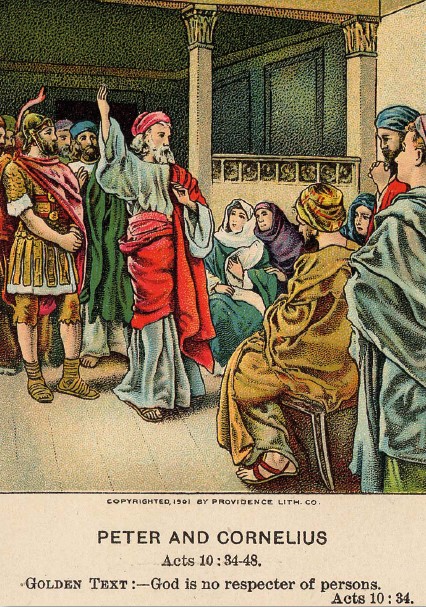‘TRULY, I SAY TO YOU, unless you turn and become like children, you will never enter the kingdom of heaven’ (Matthew 18:3). To ‘turn’ is to be converted, and Jesus believed it to be crucially important.
There is a view that conversion to Christianity is a matter simply of declaring that you believe in the Lord Jesus Christ— upon which you are saved. This does not fit with what we read in the Bible.
When we look into the Bible we see that conversion to Christianity has to do with listening to the Word of God, being convinced of its truth, repenting of our sins (that is, turning away from them), and being baptised for the forgiveness of our sins: ‘Repent and be baptized every one of you in the name of Jesus Christ for the forgiveness of your sins’ (Acts 2:38). Then we can look forward to receiving eternal life at Christ’s return: ‘Behold, I am coming soon, bringing my recompense with me, to repay everyone for what he has done’ (Revelation 22:12).
The importance of allowing God’s Word to change us is emphasised throughout the Bible. For example: ‘The law of the Lord is perfect, reviving the soul; the testimony of the Lord is sure, making wise the simple; the precepts of the Lord are right, rejoicing the heart; the commandment of the Lord is pure, enlightening the eyes’ (Psalm 19:7-8).
Let’s consider two examples of people who were converted to Christianity.
The Conversion of Cornelius
Cornelius was a Roman centurion. His story is in Acts 10. He was a devout, kind- hearted and prayerful man. God approved of his character, but he needed to do more in order to be saved. An angel appeared to him and instructed him to send for the Apostle Peter. He gathered his household together and sent urgent messengers.
When Peter arrived Cornelius said, ‘I sent for you at once, and you have been kind enough to come. Now therefore we are all here in the presence of God to hear all that you have been commanded by the Lord’ (v. 33). Peter preached to them the ‘good news of peace through Jesus Christ (he is Lord of all)’ (v. 36). He told them how God raised Jesus from the dead; how he himself had seen him, and eaten and drunk with him after he was risen; that he had commanded them to preach to people that God had appointed Jesus judge of the living and the dead; and that in his name forgiveness of sins would be granted to all who believed in him, as the prophets had foretold.
At this point the Holy Spirit fell on Cornelius and his household. They spoke with tongues, which was a sign that God had accepted them. Peter asked, ‘Can anyone withhold water for baptizing these people, who have received the Holy Spirit just as we have?’ (v. 47). No objection was possible, so he commanded them to be baptised in the name of the Lord.
Cornelius was a good man, but his goodness would not save him. Peter preached the Gospel to him, and he was baptised.
The Conversion of Saul
Saul’s story is in Acts 9. He was an earnest and zealous man, and devoted to God’s service. He was so zealous that he persecuted people whom he saw as a threat to the Jewish faith. His conversion happened as he was on the way to Damascus to seek out and punish the Christians there. He was more honoured than Cornelius, because he was visited not by an angel but by Jesus Christ himself, confronting him in a blinding light from heaven. He later wrote to the Galatians:
‘For I would have you know, brothers, that the gospel that was preached by me is not man’s gospel. For I did not receive it from any man, nor was I taught it, but I received it through a revelation of Jesus Christ’ (Galatians 1:11–12).
Jesus Christ spoke to him, and he was struck blind. The Lord sent another disciple to heal him (Acts 9:10–12). He was immediately baptised (v. 18). Then being inspired and empowered to work miracles in the name of Jesus, he set about preaching in Jesus’ name for the forgiveness of sins: ‘Let it be known to you therefore, brothers, that through this man forgiveness of sins is proclaimed to you’ (Acts 13:38).
This is the process of conversion, and we see it repeated throughout the book of Acts. For example ‘Many of the Corinthians hearing Paul believed and were baptized’ (Acts 18:8). It involves hearing the Gospel message, being convinced of its truth, turning our lives around, being baptised for the forgiveness of our sins, and living a new life in obedience to the Lord Jesus who said, ‘If anyone would come after me, let him deny himself and take up his cross daily and follow me’ (Luke 9:23).
Bible Fingerpost



